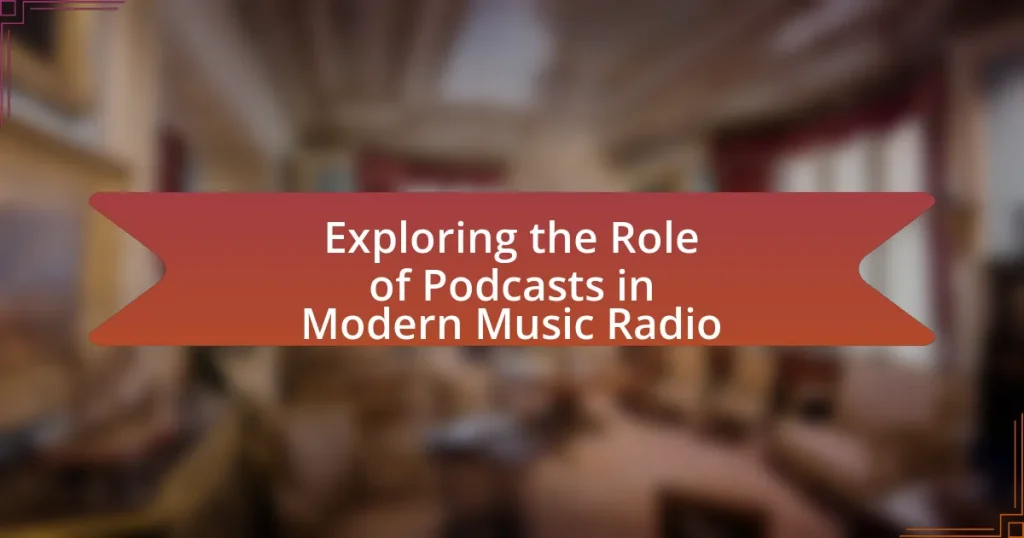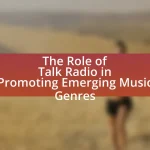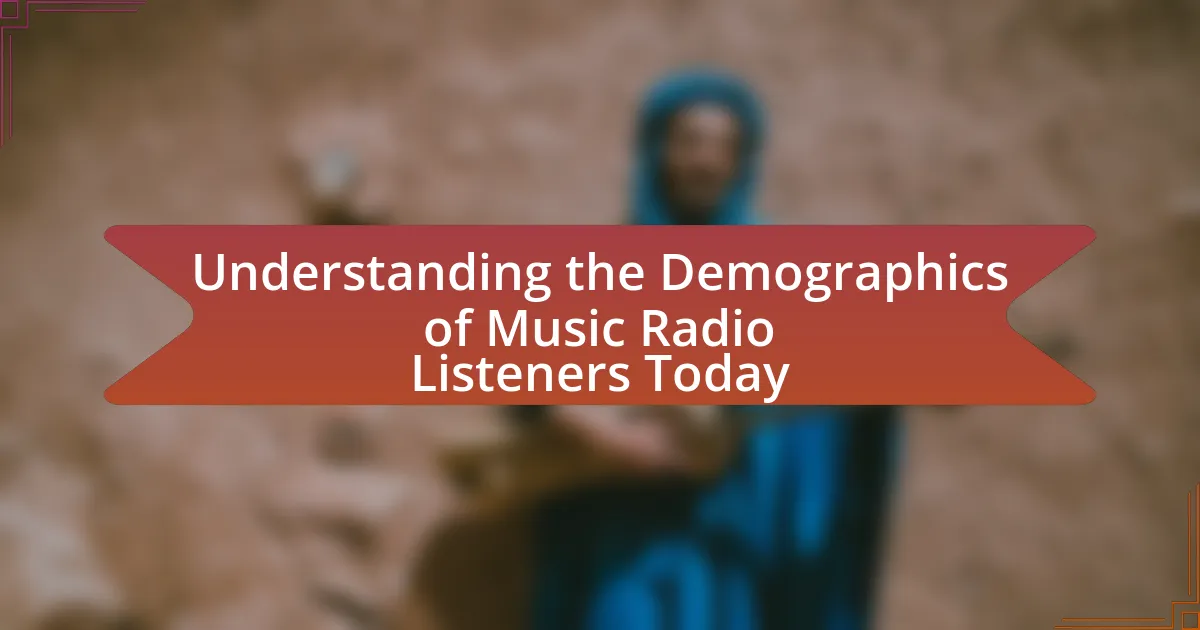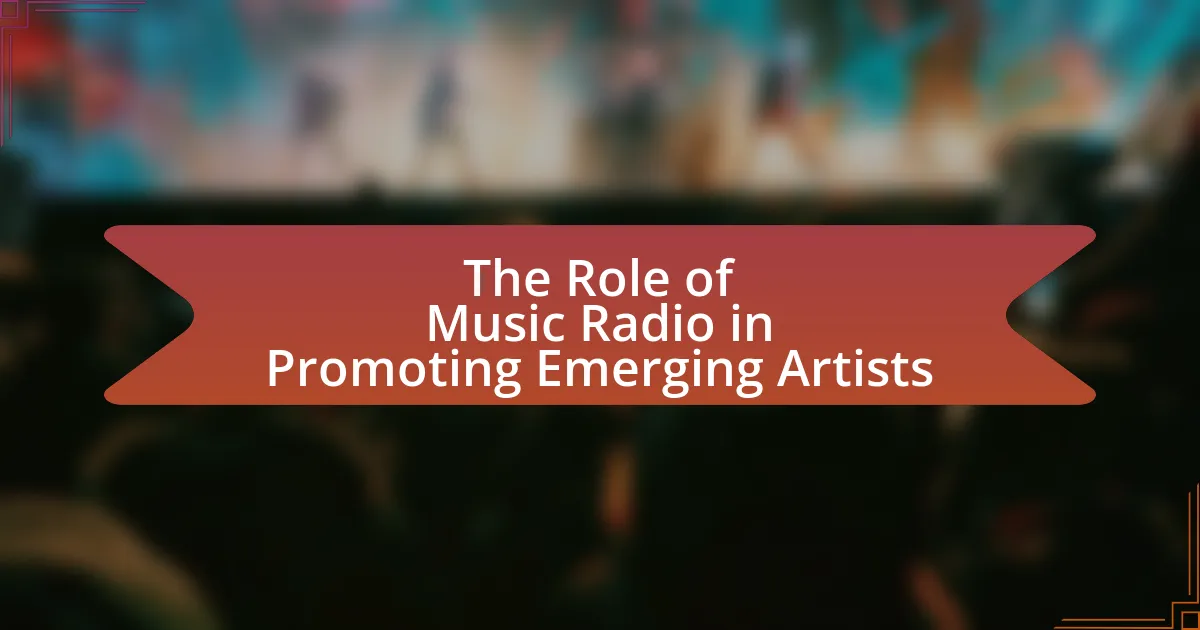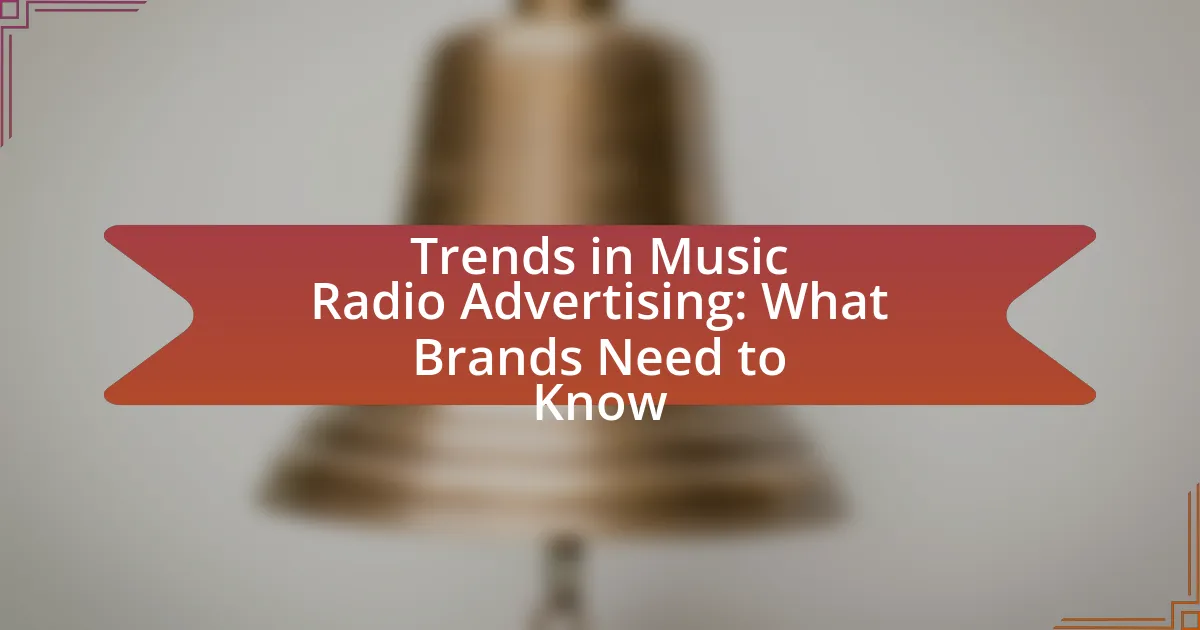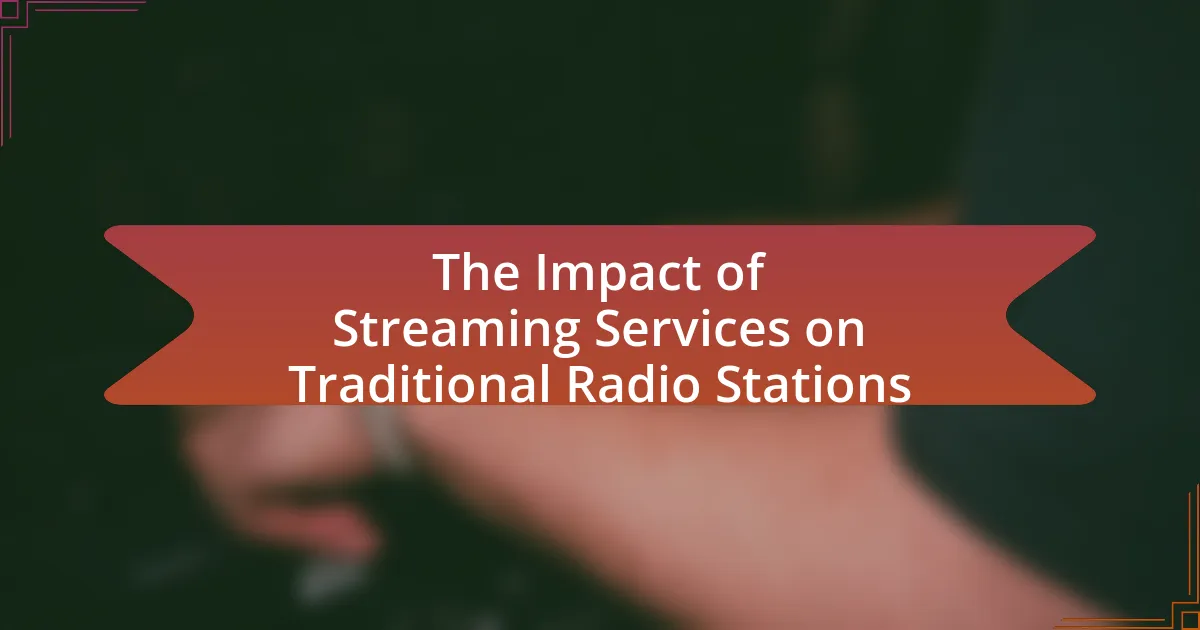Podcasts have become a vital component of modern music radio, offering an alternative platform for music discovery, artist interviews, and genre exploration. They provide on-demand content that caters to diverse listener preferences, significantly transforming the landscape of music radio by enhancing engagement and personalization. The article examines the key differences between traditional music radio and podcasting, the growing popularity of podcasts in the music industry, and the challenges faced by radio stations in adapting to this shift. Additionally, it explores the integration of podcasts into radio programming, the impact of demographics on listenership, and the technological advancements that support this evolving relationship.
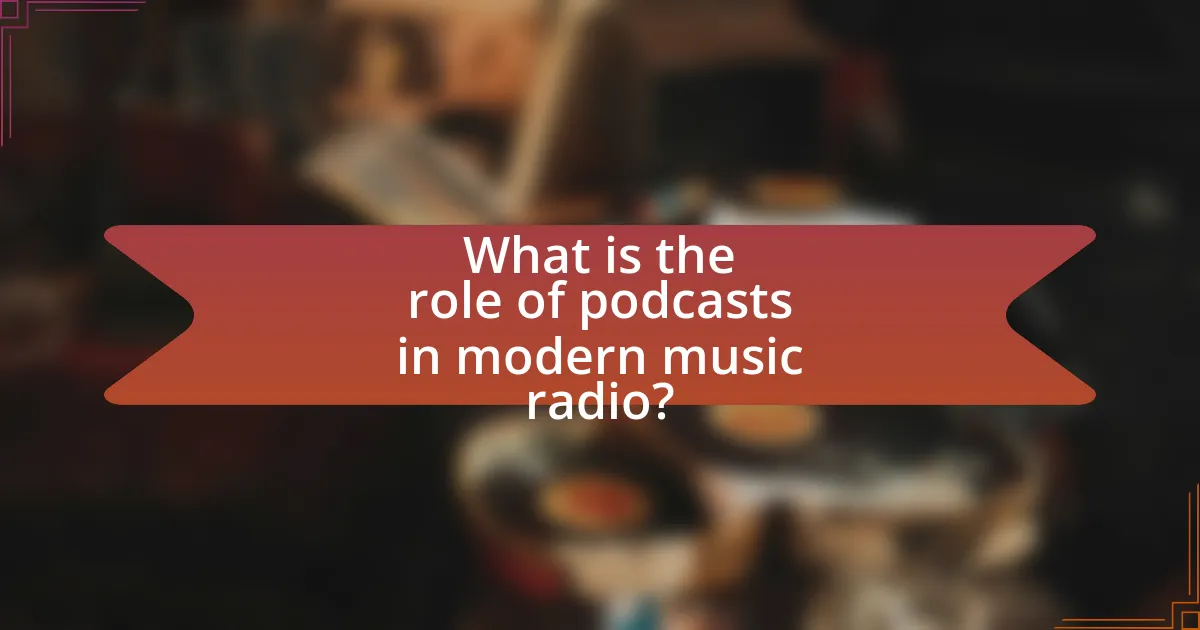
What is the role of podcasts in modern music radio?
Podcasts play a significant role in modern music radio by providing an alternative platform for music discovery, artist interviews, and genre exploration. They allow listeners to engage with music content on-demand, catering to diverse tastes and preferences. According to a 2021 report by Edison Research, 41% of Americans aged 12 and older have listened to a podcast in the past month, indicating a growing audience for audio content. This trend enhances traditional radio by integrating podcasts into programming, allowing stations to reach wider audiences and create niche content that resonates with specific listener demographics.
How have podcasts transformed the landscape of music radio?
Podcasts have transformed the landscape of music radio by providing on-demand, niche content that caters to diverse listener preferences. Unlike traditional radio, which follows a fixed schedule and often targets a broad audience, podcasts allow creators to explore specific genres, themes, and artist interviews in depth, fostering a more personalized listening experience. According to a 2021 report by Edison Research, 41% of Americans aged 12 and older have listened to a podcast in the past month, indicating a significant shift in how audiences consume audio content. This shift has led music radio stations to adapt by incorporating podcast-style programming and creating original content to engage listeners who prefer the flexibility and variety that podcasts offer.
What are the key differences between traditional music radio and podcasting?
Traditional music radio primarily broadcasts live content with scheduled programming, while podcasting offers on-demand audio content that listeners can access anytime. Traditional radio relies on real-time broadcasting, often featuring music, news, and talk segments, which are typically constrained by time slots and regulatory requirements. In contrast, podcasts allow creators to produce episodes that can be edited and released at their discretion, providing flexibility in content length and format. According to Edison Research, as of 2023, over 80 million Americans listen to podcasts monthly, highlighting the growing preference for on-demand audio over traditional radio formats.
How do podcasts enhance listener engagement compared to traditional radio?
Podcasts enhance listener engagement compared to traditional radio by offering on-demand content that allows listeners to choose topics of interest and listen at their convenience. This flexibility leads to a more personalized experience, as listeners can select specific episodes that resonate with their preferences, unlike traditional radio, which follows a fixed schedule and programming. Research indicates that 80% of podcast listeners prefer the format for its ability to provide niche content tailored to their interests, fostering a deeper connection with the material. Additionally, podcasts often encourage listener interaction through social media and community forums, further increasing engagement levels compared to the one-way communication typical of traditional radio broadcasts.
Why are podcasts becoming increasingly popular in the music industry?
Podcasts are becoming increasingly popular in the music industry due to their ability to provide in-depth storytelling and artist engagement. This format allows musicians to connect with their audience on a personal level, offering insights into their creative processes and personal lives. According to a 2021 report by Edison Research, 41% of Americans aged 12 and older have listened to a podcast in the past month, indicating a growing trend in audio consumption. Additionally, platforms like Spotify and Apple Podcasts have integrated music and podcasting, making it easier for listeners to access both forms of content in one place. This convergence enhances the visibility of artists and promotes their music through discussions, interviews, and curated playlists, further driving the popularity of podcasts within the music industry.
What factors contribute to the rise of podcasting among music enthusiasts?
The rise of podcasting among music enthusiasts is primarily driven by the accessibility of content and the desire for niche programming. Music enthusiasts can easily access a wide variety of podcasts that cater to specific genres, artists, or themes, allowing them to explore music in a more personalized way. According to a 2021 report by Edison Research, 41% of Americans aged 12 and older have listened to a podcast in the past month, indicating a growing trend in audio consumption. Additionally, the interactive nature of podcasts, where listeners can engage with hosts and participate in discussions, enhances the community aspect among music fans. This combination of accessibility, niche content, and community engagement significantly contributes to the popularity of podcasting in the music sector.
How do demographics influence podcast listenership in music?
Demographics significantly influence podcast listenership in music by determining the preferences and behaviors of different age groups, genders, and cultural backgrounds. For instance, younger audiences, particularly those aged 18-34, are more likely to engage with music podcasts, as evidenced by a 2021 report from Edison Research, which found that 50% of this age group listens to podcasts monthly. Additionally, gender differences play a role; women tend to prefer podcasts that focus on storytelling and personal experiences, while men often gravitate towards music analysis and interviews. Cultural background also affects content preferences, with diverse audiences seeking podcasts that reflect their musical heritage and interests. These demographic factors shape not only the types of music podcasts produced but also their marketing strategies, ultimately influencing overall listenership.
What challenges do music radio stations face with the rise of podcasts?
Music radio stations face significant challenges due to the rise of podcasts, primarily in audience retention and advertising revenue. As podcasts offer on-demand content tailored to specific interests, they attract listeners who prefer personalized experiences over traditional radio programming. This shift has led to a decline in live radio listenership; for instance, a 2021 report indicated that 41% of Americans aged 12 and older listened to podcasts monthly, highlighting a growing preference for this medium. Additionally, advertisers are increasingly allocating budgets to podcasts, which often provide targeted advertising opportunities, further straining the financial resources of music radio stations that rely on traditional ad models.
How do podcasts compete with traditional music radio for audience attention?
Podcasts compete with traditional music radio for audience attention by offering on-demand content that caters to specific interests and preferences. Unlike traditional radio, which follows a fixed schedule and often includes commercial interruptions, podcasts provide listeners with the flexibility to choose when and what to listen to, enhancing user engagement. According to Edison Research, as of 2023, 62% of Americans aged 12 and older have listened to a podcast, indicating a significant shift in listening habits away from traditional radio. This trend is further supported by the fact that podcast listeners tend to spend more time consuming audio content, with an average of 6 hours and 39 minutes per week, compared to traditional radio listeners.
What are the financial implications for music radio stations due to podcasting?
Podcasting has significant financial implications for music radio stations, primarily by diverting advertising revenue and listener engagement. As audiences increasingly turn to podcasts for on-demand content, traditional radio stations face declining ad revenues, with a reported 20% drop in radio ad spending in recent years, as advertisers shift budgets to digital platforms, including podcasts. Additionally, music radio stations may incur costs related to producing their own podcasts to remain competitive, which can strain budgets. The rise of podcasting also encourages radio stations to explore new revenue streams, such as subscription models or partnerships with podcast creators, to offset losses.
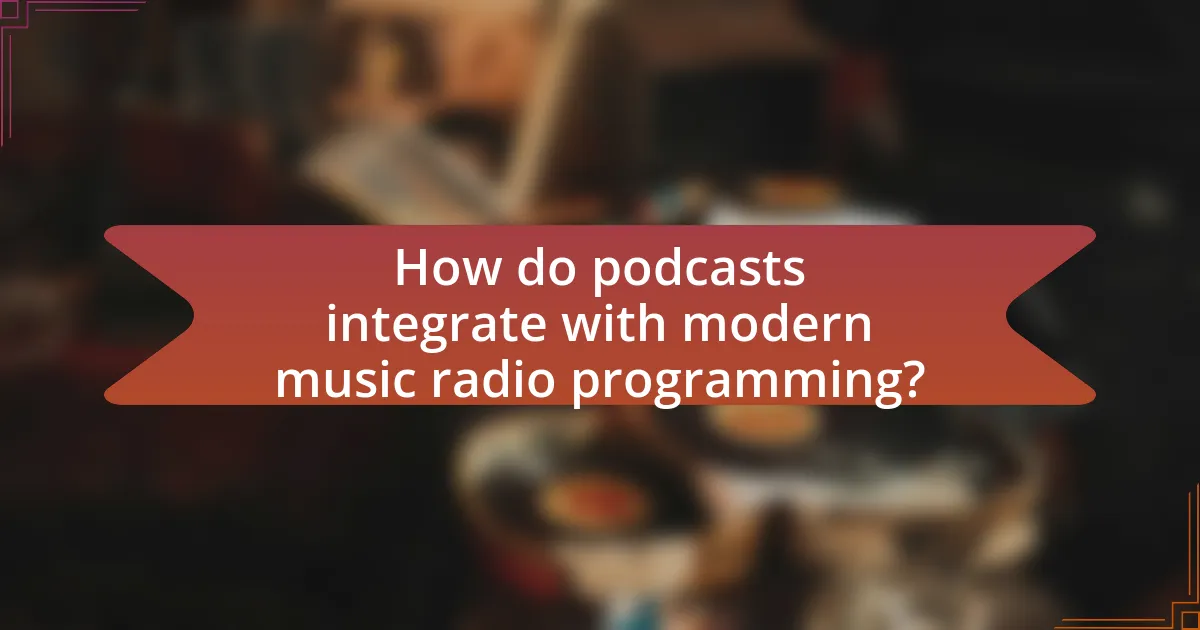
How do podcasts integrate with modern music radio programming?
Podcasts integrate with modern music radio programming by providing on-demand content that complements live broadcasts. This integration allows radio stations to reach audiences beyond traditional listening hours, enhancing listener engagement through curated playlists, artist interviews, and music discussions. For instance, many radio stations now offer podcast versions of their shows, enabling listeners to access content at their convenience, which aligns with the growing trend of personalized media consumption. Additionally, the incorporation of podcasts into radio programming can attract younger demographics who prefer digital platforms, thereby expanding the audience base and increasing overall listenership.
What types of podcasts are most commonly featured in music radio?
Music radio commonly features podcasts that focus on artist interviews, music reviews, genre explorations, and music history. These types of podcasts engage listeners by providing insights into the creative process of musicians, analyzing new releases, discussing various music genres, and recounting significant historical events in music. For instance, podcasts like “Song Exploder” delve into the stories behind specific songs, while “All Songs Considered” offers reviews and recommendations of new music, illustrating the diverse content that appeals to music enthusiasts.
How do music-focused podcasts differ from general entertainment podcasts?
Music-focused podcasts primarily concentrate on musical content, including artist interviews, album reviews, and genre discussions, while general entertainment podcasts cover a broader range of topics such as movies, television, and pop culture. The specificity of music-focused podcasts allows for deeper exploration of musical themes, trends, and industry insights, which are often supported by expert opinions and detailed analysis of songs and albums. In contrast, general entertainment podcasts tend to prioritize a variety of subjects, leading to a more superficial treatment of any single topic, including music. This distinction is evident in listener engagement, as music-focused podcasts often attract audiences specifically interested in music, resulting in a more dedicated and niche following compared to the wider appeal of general entertainment podcasts.
What role do interviews and guest appearances play in music podcasts?
Interviews and guest appearances are crucial in music podcasts as they provide unique insights and personal stories from artists, enhancing listener engagement. These interactions allow hosts to delve into the creative processes, influences, and experiences of musicians, which can foster a deeper connection between the audience and the artists. For instance, a study by the Pew Research Center found that 64% of podcast listeners are more likely to engage with content featuring interviews, indicating that such formats significantly boost listener retention and interest.
How can music radio stations leverage podcasts to enhance their brand?
Music radio stations can leverage podcasts to enhance their brand by creating unique, on-demand content that engages listeners beyond traditional broadcasting. This strategy allows stations to reach a wider audience, as podcasts can be accessed anytime and anywhere, increasing brand visibility. According to Edison Research, 55% of the U.S. population has listened to a podcast, indicating a significant market for radio stations to tap into. By producing podcasts that feature artist interviews, music reviews, and behind-the-scenes content, radio stations can strengthen their connection with listeners and foster community engagement. This approach not only diversifies content offerings but also positions the station as a thought leader in the music industry, ultimately enhancing brand loyalty and recognition.
What strategies can be employed to create a successful music podcast?
To create a successful music podcast, one effective strategy is to define a clear niche that resonates with a specific audience. This involves selecting a unique theme or genre, such as indie music or music history, which can attract dedicated listeners. Research indicates that podcasts with a focused topic tend to have higher engagement rates, as they cater to the interests of a targeted demographic.
Additionally, maintaining high production quality is crucial; this includes clear audio, professional editing, and engaging sound design. According to a study by Edison Research, 67% of podcast listeners consider audio quality a significant factor in their enjoyment of a podcast.
Regularly featuring guest interviews with musicians, industry experts, or influencers can also enhance content richness and provide diverse perspectives, which can attract a broader audience. Engaging with listeners through social media and soliciting feedback can foster a community around the podcast, increasing listener loyalty and word-of-mouth promotion.
Finally, consistent release schedules help build anticipation and reliability among listeners, as shown by data from Podtrac, which indicates that podcasts with regular episodes tend to retain more subscribers.
How can cross-promotion between radio and podcasts be effectively executed?
Cross-promotion between radio and podcasts can be effectively executed by integrating content and audience engagement strategies. Radio stations can feature podcast segments during broadcasts, providing listeners with a taste of the podcast’s content, while podcasts can promote their affiliated radio shows through mentions and exclusive content. This method leverages the existing audience of both platforms, enhancing listener retention and expanding reach. For instance, a study by Edison Research found that 54% of podcast listeners also listen to traditional radio, indicating a significant overlap that can be capitalized on through strategic cross-promotion.
What technological advancements support the integration of podcasts in music radio?
Technological advancements such as streaming platforms, mobile applications, and automated content management systems support the integration of podcasts in music radio. Streaming platforms enable seamless access to both music and podcast content, allowing listeners to switch between formats easily. Mobile applications facilitate on-the-go listening, making it convenient for users to engage with podcasts alongside traditional radio broadcasts. Automated content management systems streamline the scheduling and distribution of podcasts, ensuring that radio stations can efficiently incorporate them into their programming. These advancements collectively enhance the listener experience and broaden the reach of music radio by integrating diverse audio content.
How do streaming platforms facilitate podcast distribution for music radio?
Streaming platforms facilitate podcast distribution for music radio by providing a centralized platform for content creators to upload, manage, and distribute their podcasts to a wide audience. These platforms, such as Spotify and Apple Podcasts, offer tools that simplify the submission process, allowing music radio stations to reach listeners across various devices and locations. Additionally, streaming platforms often feature algorithms that promote podcasts based on user preferences, enhancing discoverability and engagement. According to a 2022 report by Edison Research, 62% of Americans aged 12 and older have listened to a podcast, indicating the growing audience that music radio can tap into through these distribution channels.
What tools are available for music radio stations to produce high-quality podcasts?
Music radio stations can utilize tools such as Adobe Audition, Audacity, and GarageBand to produce high-quality podcasts. Adobe Audition offers advanced audio editing features and multi-track mixing capabilities, making it suitable for professional-grade production. Audacity is a free, open-source software that provides essential editing tools and is user-friendly for beginners. GarageBand, available on Apple devices, combines ease of use with powerful features for recording and editing audio. These tools enable radio stations to enhance sound quality, edit content effectively, and create engaging podcasts that resonate with their audience.
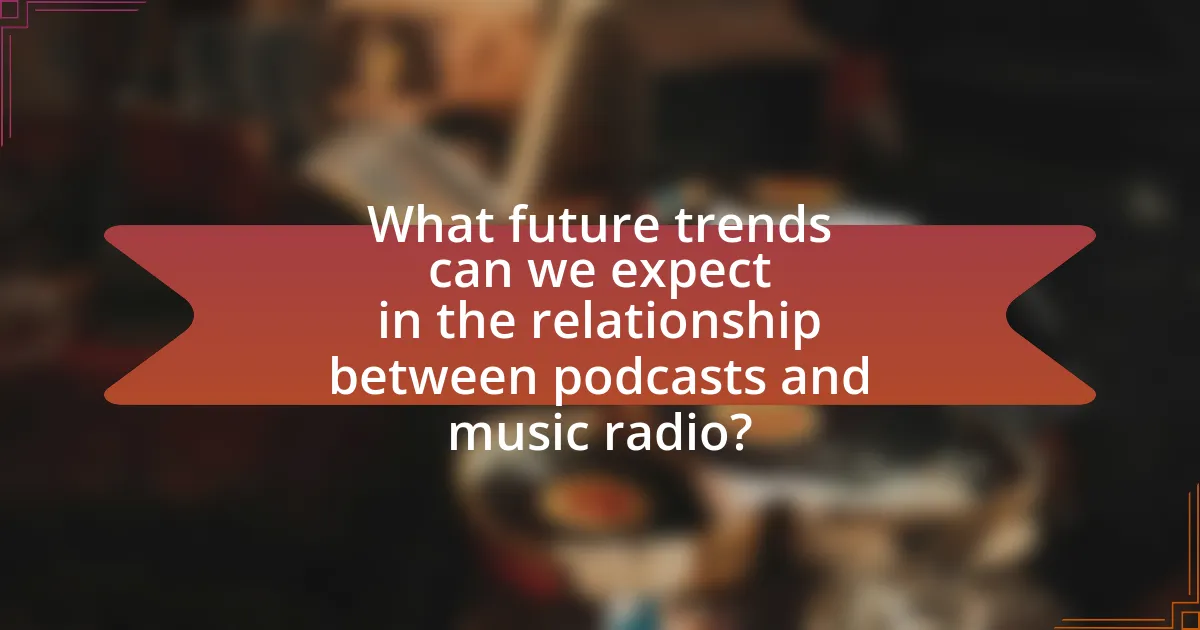
What future trends can we expect in the relationship between podcasts and music radio?
The future trends in the relationship between podcasts and music radio will likely include increased integration of podcast content into traditional radio programming and a growing emphasis on personalized audio experiences. As music radio stations seek to attract younger audiences, they are increasingly incorporating podcast-style segments that feature storytelling and interviews, which can enhance listener engagement. According to a 2022 report by Edison Research, 41% of Americans aged 12 and older listen to podcasts monthly, indicating a significant overlap in audience interest that radio can capitalize on. Additionally, advancements in technology will enable radio stations to offer on-demand podcast content, allowing listeners to choose when and what they want to hear, further blurring the lines between live radio and podcasting.
How might the evolution of technology impact music podcasts?
The evolution of technology will significantly enhance music podcasts by improving accessibility, content quality, and audience engagement. Advancements such as high-speed internet, mobile devices, and streaming platforms enable listeners to access music podcasts anytime and anywhere, increasing their reach. Additionally, technologies like artificial intelligence and machine learning can personalize content recommendations, tailoring playlists and episodes to individual preferences, which has been shown to boost listener retention rates. Furthermore, improved audio production tools allow creators to produce higher-quality sound, making the listening experience more enjoyable. According to a report by Edison Research, 55% of the U.S. population has listened to a podcast, indicating a growing audience that technology continues to support.
What emerging platforms are likely to influence podcast consumption in music?
Emerging platforms likely to influence podcast consumption in music include Spotify, Apple Podcasts, and YouTube. Spotify has rapidly expanded its podcast offerings, integrating music and podcasts into a single platform, which has led to a significant increase in user engagement; as of 2023, Spotify reported over 500,000 podcasts available. Apple Podcasts remains a dominant player, leveraging its extensive user base and seamless integration with Apple devices to attract listeners. YouTube, with its vast audience and video capabilities, is increasingly becoming a popular platform for podcast consumption, especially for music-related content, as it allows creators to reach a broader audience through visual elements. These platforms are reshaping how audiences access and engage with music podcasts, driving growth in the podcasting sector.
How will listener preferences shape the future of music podcasts?
Listener preferences will significantly shape the future of music podcasts by driving content creation and format innovation. As audiences increasingly seek personalized and niche content, podcast creators will adapt by focusing on specific genres, artist interviews, and thematic storytelling that resonate with listener interests. For instance, a survey by Edison Research in 2022 indicated that 54% of podcast listeners prefer shows that cater to their specific music tastes, highlighting the demand for tailored content. This trend will likely lead to a diversification of music podcast formats, including interactive elements and community engagement, to enhance listener experience and retention.
What best practices should music radio stations adopt for podcasting?
Music radio stations should adopt a structured approach to podcasting that includes consistent branding, high-quality audio production, and audience engagement strategies. Consistent branding ensures that the podcast aligns with the station’s identity, making it recognizable and appealing to listeners. High-quality audio production is crucial, as studies show that poor sound quality can lead to listener drop-off; therefore, investing in good equipment and editing software is essential. Additionally, engaging with the audience through social media and soliciting feedback can enhance listener loyalty and foster a community around the podcast. These practices are supported by industry trends indicating that well-produced and interactive podcasts tend to attract larger audiences and maintain listener interest over time.
How can content quality be maintained in music podcasts?
Content quality in music podcasts can be maintained through consistent research, expert interviews, and high production standards. Consistent research ensures that the content is relevant and engaging, while expert interviews provide credibility and depth to discussions. High production standards, including clear audio quality and professional editing, enhance the listening experience. According to a study by Edison Research, 75% of podcast listeners prefer well-produced content, indicating that production quality directly influences audience retention and satisfaction.
What are effective marketing strategies for promoting music podcasts?
Effective marketing strategies for promoting music podcasts include leveraging social media platforms, collaborating with influencers, and utilizing targeted advertising. Social media platforms like Instagram and TikTok allow for engaging content sharing, which can attract listeners; for instance, 54% of podcast listeners discover new shows through social media. Collaborating with influencers in the music industry can expand reach, as influencers often have dedicated followings that trust their recommendations. Additionally, targeted advertising on platforms such as Facebook and Google can effectively reach specific demographics interested in music, enhancing visibility and listener acquisition. These strategies are supported by data indicating that podcasts with strong social media presence and influencer partnerships see higher engagement rates and audience growth.
